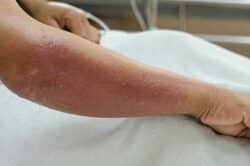Paraquat, a commonly used herbicide, can cause serious health concerns and even death from regular exposure or acute poisoning. If you or a loved one has experienced paraquat exposure and poisoning symptoms, you may be able to take legal action against the manufacturers by joining an ongoing mass tort against them.
The attorneys in our network provide free case evaluations and can help you understand your rights. You may be eligible to recover compensation for your medical bills and more if you have experienced paraquat exposure. Fill out our contact form today for help with your case.
What Is Paraquat Herbicide?
Paraquat Dichloride, more commonly known as paraquat, is a common weed killer used for commercial agriculture in the United States. It is one of the most commonly used chemicals for killing unwanted plants worldwide. It inhibits the growth of weeds and grasses in many crops, including:
- Corn
- Wheat
- Cotton
- Soybeans
- Fruits
- Peanuts
- Artichokes
- Sweet potatoes
The herbicide works by damaging the cell membranes and cytoplasm of the targeted weeds. It is very effective at killing grasses and weeds while preserving other nearby plants, such as the crops in the field. This makes it very popular for large agricultural applications such as commercial farms, orchards, and vineyards.
In the United States, manufacturers add blue dye and a notable odor to the herbicide to help prevent accidental ingestion. In addition, there is also a substance that induces vomiting in the formula. Paraquat sourced from outside the United States may not have these safeguards.
How Is Paraquat Used?
In the United States, paraquat is available in various concentrated mixes for those certified to apply the product. It is mixed with water and sprayed onto the weeds using hand-held sprayers, elevated spraying equipment, or crop duster planes.
Depending on their needs and the crops they plant, commercial farms and smaller family farms may use it to clear the ground before planting or after the harvest. Some farms use it to clear weeds and grasses during the growing season as well.
Who Is Most Likely to Experience Paraquat Exposure?
In general, most who experience paraquat exposure or poisoning are those who work on farms and other places where they use the herbicide. Exposure generally occurs by inhaling the herbicide during application. Ingestion causes acute injuries while contact with the skin can cause irritation and health concerns.
The people most likely to experience long-term or acute exposure include:
- Certified applicators
- Agricultural workers
- Those who work in factories that produce these herbicides
Residents living near large agricultural farms sometimes suffer exposure when spraying equipment or planes release paraquat into the air. Of those who ingest paraquat, most also live or work on farms or in agricultural areas. Ingestion can occur accidentally when people store the mixed concentrate in jugs or bottles meant for drinks which is why the United States now requires:
- Applicators to pass certification classes
- No storage in unmarked, unapproved containers
- Manufacturers to add dyes, smelling agents, and medication to induce vomiting
Unfortunately, paraquat poisoning is also a method of suicide used by some wishing to take their own lives.
How Does Paraquat Work?
According to information published in Pest Management Science, paraquat is unusual because it is only effective when it directly contacts the plants. It does not contaminate the soil or affect other crops nearby. Because of the way the chemical interrupts photosynthesis, it kills light green plants while leaving others—and the soil—unaffected.
One paraquat manufacturer, Syngenta Global, touts the benefits of their herbicide, which include:
- Saving labor by clearing fields manually
- Protecting against invasive weeds and grasses
- Helping produce key crops
- Reducing erosion
- Protecting soil health
- Combating climate change
The bottom line is that many farmers and agriculture companies use paraquat because it is relatively inexpensive and highly effective. It works even on glyphosate (RoundUp) resistant weeds.
Signs and Symptoms of Paraquat Exposure
When a person suffers paraquat exposure, they may:
- Experience immediate, acute symptoms
- Initially experience only minor symptoms such as irritation
- Have no noticeable symptoms of exposure initially but later develop related concerns
What happens in the days following paraquat exposure—and over the years to come—depends on several factors. This includes:
- Method of exposure: Swallowing, inhaling, or via skin contact
- How much exposure occurred
- How long or how often they suffered exposure
- Their overall health and related factors, such as asthma or other lung damage
Ingestion of paraquat can lead to almost instant irritation in the mouth and throat. More severe symptoms, including death, could follow. Inhalation can irritate the nose and lungs, although this is generally not as serious as ingestion.
Sometimes, there are no symptoms of inhalation or skin contact. However, there are long-term health concerns possibly linked to long-term or excessive exposure to the herbicide.
Symptoms and Side Effects of Exposure
According to the Centers for Disease Control and Prevention (CDC), ingesting paraquat can cause instant symptoms. This includes intense pain and swelling of the tissues in the mouth and throat. It makes it difficult for the person to ask for help, rinse out their mouth, or take other measures to limit their exposure.
Short-Term Side Effects: Ingestion of paraquat not only causes pain and swelling, but digestive symptoms often become intense quickly. They may include nausea and vomiting, cramping, and diarrhea which can cause issues with dehydration. Difficulty breathing and low blood pressure are also major concerns.
Many patients die from paraquat poisoning within a week or two, especially without advanced medical intervention from a doctor who knows how to treat this type of poisoning.
Long-Term Side Effects: When a person survives acute paraquat poisoning, they will likely have lasting damage. This can include:
- Lung scarring
- Kidney damage
- Heart failure
- Irreparable damage to the digestive tract, including the throat and stomach
Over time, ongoing minor exposure to paraquat through inhaling it during applications may also cause lasting concerns. This could include:
- Lung scarring, known as pulmonary fibrosis
- Kidney damage
- Liver damage
Paraquat Exposure May Have Links to Parkinson’s Disease
Recent research shows there may be a link between herbicide exposure and an increased risk of Parkinson’s disease. Several studies uncovered a significant link between paraquat and the central nervous system disorder known to cause tremors and other movement issues. These include:
- Environmental Health Perspectives: Published in 2011, this study shows that participants who worked with paraquat and another herbicide were 2.5 times more likely to receive a Parkinson’s disease diagnosis.
- The American Journal of Epidemiology: This 2009 study used historical data to estimate that those with exposure to paraquat and another herbicide (maneb) had a 75 percent increased risk of Parkinson’s disease.
The potential link to Parkinson’s disease is the basis of the paraquat mass tort underway in the U.S. District Court in the Southern District of Illinois. The Judicial Panel on Multidistrict Litigation (JPML) consolidated these cases into multidistrict litigation. The JPML reported 1,448 lawsuits in MDL-3004 as of July 15, 2022.
If you have a known paraquat exposure and have a Parkinson’s disease diagnosis, you may still be able to join this MDL now in progress. The best way to learn more is to connect with an attorney reviewing these cases now. Many will offer free case reviews for potential claimants.
How Can I Protect Myself from Paraquat Exposure?
Paraquat can cause serious health concerns. The best option to keep yourself safe around the herbicide is to take steps to avoid ingestion, inhalation, or skin exposure. If you work or live in areas where farms frequently use weed killer, understanding best practices can help you limit how much exposure you receive.
Never purchase, apply, or oversee paraquat applications without the proper certification. The Environmental Protection Agency (EPA) classifies it as a ‘Restricted Use Pesticide’ (RUP). In addition to requiring a certified party to oversee its application like most RUPs, paraquat requires a certification to work with it. Following this rule will help minimize your exposure.
In addition, it is essential to always use caution when others use the herbicide nearby. Everyone in the general area should wear proper protection to avoid skin or airway exposure. After use, any remaining product should remain in its original, well-marked container in a secure area. There should be no way anyone could confuse the product with anything else, including children.
What Should I Do If I Was Exposed to Paraquat?
If you suffer paraquat exposure, your next action will depend on the nature and severity of that exposure. If you have only minor skin exposure or inhale the herbicide and have relatively minor irritation, you may not need emergency medical care.
However, this could increase your risk factor for several negative health outcomes. If you have a known exposure or worked closely with paraquat, you may want to notify your doctor so they can monitor you for any new signs or symptoms of Parkinson’s disease, kidney or liver disease, or heart failure.
If you ingested any amount of paraquat by mouth, you must go to your nearest emergency room as soon as possible. This is a life-or-death situation. The tissue of your mouth, tongue, and throat will likely begin to swell and suffer intense irritation on contact. This can make it difficult to swallow or breathe within a few minutes.
How Are Paraquat Exposure and Poisoning Symptoms Treated?
If you ingest paraquat and are having trouble breathing, it is important to immediately go to the hospital. They will likely need to establish a safe airway for you to breathe. Hospitalization is generally necessary because symptoms will get worse before they improve. Since most people cannot drink and may have nausea and diarrhea, they will likely receive fluids and electrolytes intravenously.
The hospital usually monitors the patient’s blood pressure very closely. Low blood pressure is a major indicator of paraquat poisoning. They will also observe the patient for signs of organ failure, which is common. Some people remain in the hospital for several days or weeks for treatment, which could include efforts to clear the poison from their system.
Major complications could include failure of one or more organ systems, including the:
- Heart
- Kidneys
- Liver
- Respiratory system
Many people die because of respiratory system failure, usually caused by pulmonary edema. According to Drug Safety, death may occur quickly—within 48 hours—if ingestion of at least 50 mg/kg occurs. At lower doses, it may take several weeks to know if the patient will survive.
Speak to a Paraquat Lawsuit Attorney
If you have health concerns related to paraquat exposure, a Parkinson’s disease diagnosis, or lost a loved one to paraquat poisoning, the mass tort attorneys in our network can help. We are here to discuss your options for seeking justice, holding the at-fault manufacturer legally accountable, and recovering compensation. We provide complimentary initial consultations, so don’t hesitate to fill out our contact form today for help with your case.


